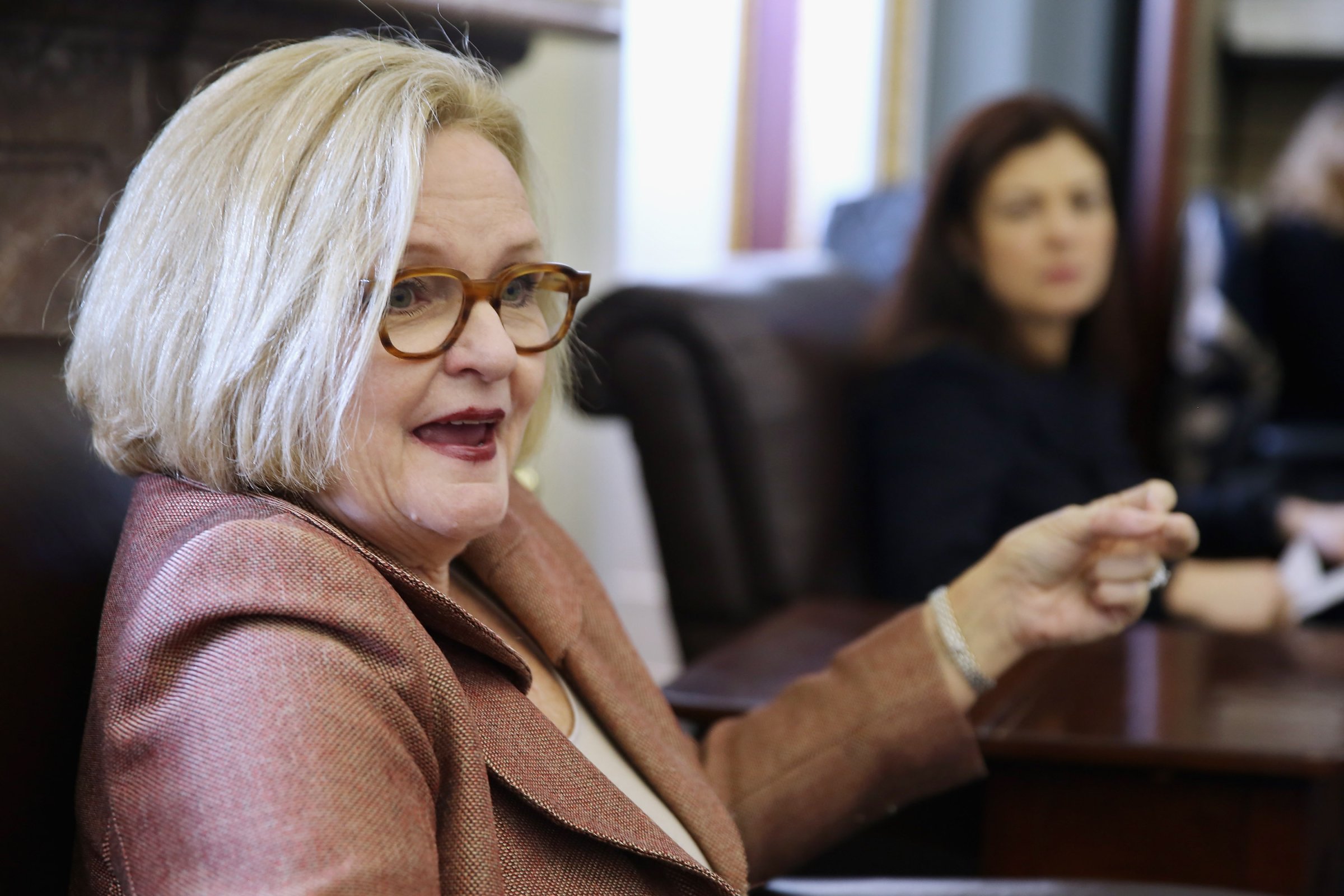
At the end of June on a stormy summer evening, the 20 Senate women gathered in the ceremonial Appropriations Committee hearing room in the U.S. Capitol to privately debate competing proposals to address sexual assault in the military. The hope was that all 20 women could unite behind a single bill. But that was never to be.
At the meeting, the women heard from the three in the midst of the debate, all of whom had served as prosecutors: North Dakota Democrat Heidi Heitkamp, New Hampshire Republican Kelly Ayotte and Missouri Democrat Claire McCaskill. McCaskill, who made her name prosecuting rape cases that others wouldn’t touch, was particularly passionate in promoting her bill. “I have more experience prosecuting sexual assault cases than anyone in the Senate. I have spent more time holding the hands of rape victims,” she told the women, according to several sources who were in the room. “This bill does not let anyone off easy.”
But 17 of the 20 women signed on to a competing measure sponsored by New York Democrat Kirsten Gillibrand. That measure failed to overcome a filibuster last week. The Senate Monday afternoon is expected to vote on McCaskill’s bill. It is expected to pass overwhelmingly.
The key difference between the two measures is that Gillibrand’s bill would have taken the prosecution of sexual assault cases out of the chain of command and given it to the Judge Advocates General Corps. Gillibrand argues than roughly a quarter of all sexual assault cases are perpetrated by someone in the chain of command, making reporting obviously difficult. Of the estimated 26,000 cases of unwanted sexual contact in 2012, only 3,000 were reported and 300 prosecuted.
McCaskill argues that other countries that have taken similar steps to remove reporting from the chain of command have not seen an uptick in reporting. McCaskill’s bill ensures that when a case is reported, if either or both the commander or prosecutor don’t want to proceed, the case is referred to the head of that military branch for review. Under Gillibrand’s bill a case ends if a prosecutor doesn’t wish to move forward. McCaskill’s bill also gets rid of the “good soldier” defense that takes into account irrelevant factors such as the service record of the accused. In cases where there is a dual jurisdiction–if say, a crime was committed off of a military base–the victim would get a say in whether the case would be handled in a civilian or military court. Importantly, given the number of reported sexual assaults in the nation’s Air Force and Naval Academies, the measure also extends protections to students in service academies. Finally, it requires that in every promotion, a commander’s record on the handling of sexual-assault cases would be taken into account.
As a whole, there is no doubt that the revisions constitute major updates to way the Pentagon handles the issue. Some politicians, such as California’s Barbara Boxer and Maryland’s Barbara Mikulski, have been pushing for these reforms for decades. But victims’ groups worry that the Pentagon has made promises of change before, only not to follow through. They argue that only by giving the cases to an outside body will true change ever be effected.
To that end, Gillbirand says she will continue to push her measure, which has the support of 56 senators, in the years to come. Several senators who opposed Gillibrand’s bill last week said in the debate that they are waiting to see how the Pentagon handles the issue and if nothing changes, they would be willing to support Gillibrand’s bill in the future.
Meanwhile, McCaskill chafes at the perception that she is somehow protecting rapists or that her bill is weaker. “The most frustrating thing about this,’’ McCaskill told the Washington Post, “is the narrative that, ‘Whose side are you on, the victim’s or the commander’s?’ That’s offensive.”
At the end of that meeting last June, all 20 women agreed that if they couldn’t agree on a bill, it was important not to demonize one bill or another and to keep the conversation civil. The ensuing nine months have tried the bounds of the female senators’ friendships and civility. That said, most if not all of the women are expected to back McCaskill’s bill on Monday. “We’re now 20 women total in the Senate,” says Mikulski, the dean of the Senate women. “We disagree on some issues, even the bills before us. But we agree on the goal of providing more prosecutorial tools to punish criminals, ensuring fairness in the process and getting help to victims.”
More Must-Reads from TIME
- Cybersecurity Experts Are Sounding the Alarm on DOGE
- Meet the 2025 Women of the Year
- The Harsh Truth About Disability Inclusion
- Why Do More Young Adults Have Cancer?
- Colman Domingo Leads With Radical Love
- How to Get Better at Doing Things Alone
- Michelle Zauner Stares Down the Darkness
Contact us at letters@time.com